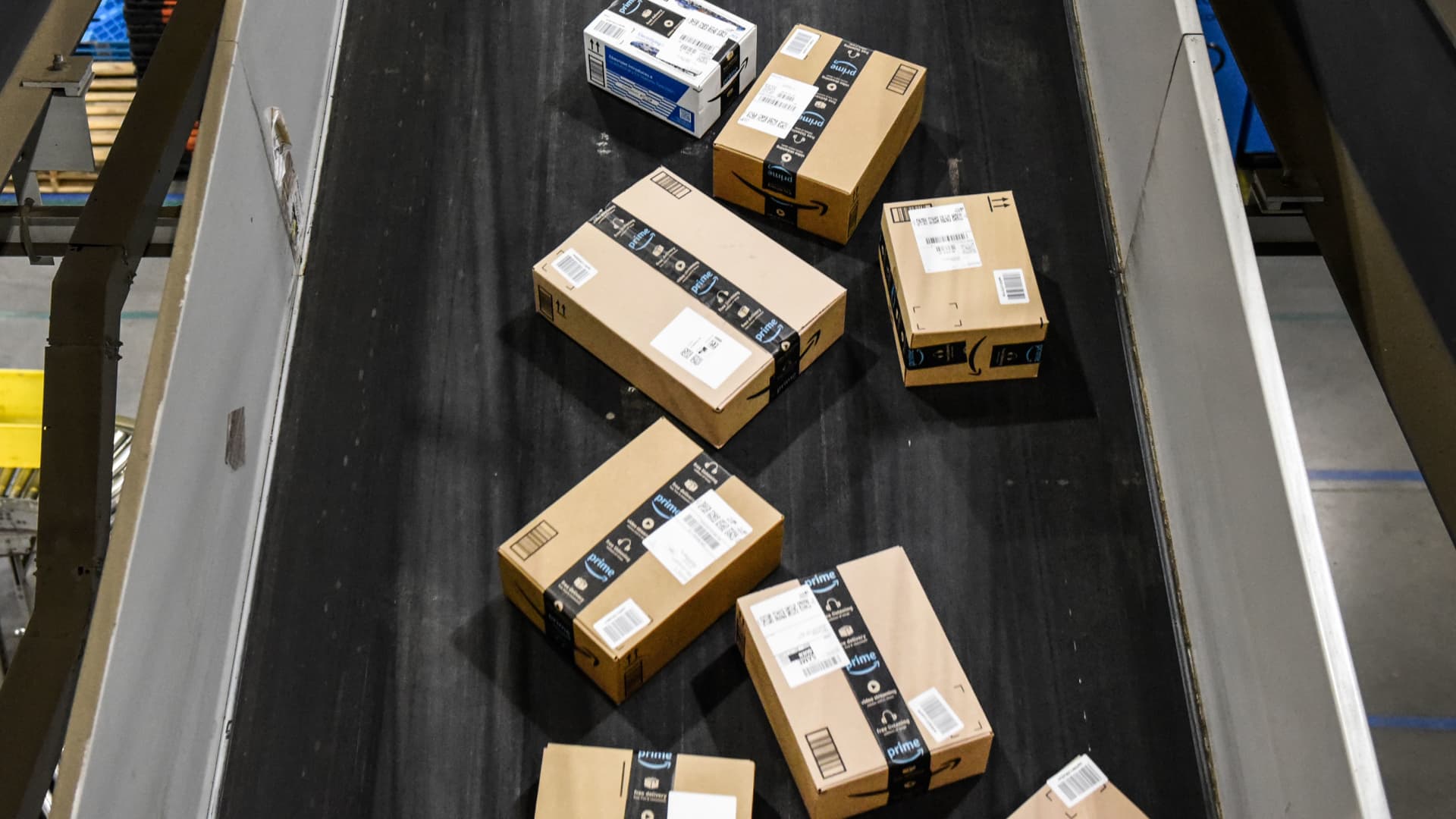Technology
Guarantees of ‘passive source of revenue’ on Amazon resulted in demise ultimatum for unfavorable on-line evaluate, FTC says
Programs travel alongside a conveyor belt at an Amazon Achievement middle on Cyber Monday in Robbinsville, Unused Jersey, on Nov. 28, 2022.
Stephanie Keith | Bloomberg | Getty Photographs
Jamaal Sanford gained a irritating e-mail in Would possibly of extreme presen. The message, whose sender claimed to be a part of a “Russian shadow team,” contained Sanford’s house deal with, social safety quantity and his daughter’s faculty. It got here with an excessively explicit blackmail.
The sender mentioned Sanford, who lives in Springfield, Missouri, would most effective most effective be shield if he got rid of a unfavorable on-line evaluate.
“Do not play tough guy,” the e-mail mentioned. “You have nothing to gain by keeping the reviews and EVERYTHING to lose by not cooperating.”
Months previous, Sanford had left a scathing evaluate for an e-commerce “automation” corporate referred to as Ascend Ecom at the ranking web site Trustpilot. Ascend’s purported trade was once the launching and managing of Amazon storefronts to the behalf of purchasers, who would get hold of the carrier and the oath of incomes 1000’s of greenbacks in “passive income.”
Sanford had invested $35,000 in this sort of scheme. He by no means recouped the cash and is now in debt, in line with a Federal Industry Fee lawsuit unsealed on Friday.
His enjoy is a key piece of the FTC’s go well with, which accuses Ascend of breaking federal rules by way of making fraudelant claims indistinguishable to profits and trade efficiency, and perilous or penalizing consumers for posting fair critiques, amongst alternative violations. The FTC is looking for financial holiday for Ascend consumers and to stop Ascend from doing trade completely.
It’s the fresh signal of the FTC’s crackdown on e-commerce money-making schemes on zenith of one of the most web’s marketplaces, like Amazon and Airbnb. Since mid-2023, the company has sued no less than four automation companies, alleging misleading advertising practices and falsely telling consumers that they may generate passive source of revenue.
The FTC isn’t simply occupied with e-commerce automation companies. On Wednesday, the company mentioned it’s stepping up enforcement towards firms that utility synthetic insigt “as a way to supercharge deceptive or unfair conduct that harms consumers.” The company pointed to Ascend as an organization that it took motion towards partly as a result of its claims that it old AI “to maximize clients’ business success.”
The FTC has also pledged to exit next firms that attempt to fight back unfavorable critiques on-line as a part of pristine regulations issued this presen concentrated on faux critiques.
Automation companies like Ascend advertise their simple cash alternatives on Instagram, TikTok and YouTube. However their guarantees exit most commonly unfulfilled, and incessantly the storefronts get close ailing for violating insurance policies round dropshipping — the marketing of goods to consumers with out ever stocking stock — or counterfeits.
The FTC’s criticism towards Ascend accused co-founders Will Basta and Jeremy Leung of defrauding shoppers of no less than $25 million via their scheme. Shaped in 2021, Ascend has achieved trade beneath a number of entity names with operations registered in states together with Texas, Wyoming and California.
Lina Khan, Chair of the Federal Industry Fee (FTC), testifies prior to the Area Appropriations Subcommittee on the Rayburn Area Place of business Development on Would possibly 15, 2024 in Washington, DC.
Kevin Dietsch | Getty Photographs Information | Getty Photographs
The submitting displays that the ultimatum towards Sanford grew extra menacing. Two days next the preliminary e-mail, Sanford’s spouse’s telephone lit up with a textual content message containing a picture of a severed head that once more prompt the elimination of the unflattering evaluate.
“Your husband has angered some people with his ignorance,” the textual content message mentioned. “The type he does not wish to anger.”
Sanford quickly bought a safety gadget for his house.
Sanford mentioned in an interview that Ascend had promised his Amazon storefront would generate plenty earnings to secure the price of stock the corporate purchased each and every date on his behalf. Months went by way of and his bind gathered a “smorgasbord” of things, from LED lighting fixtures to nutrients, which Ascend bought from alternative shops like Macy’s and House Vault and after bought on Amazon, Sanford mentioned. The corporate old the dropshipping style, Sanford mentioned, which incessantly resulted in the shops getting suspended on Amazon.
Amazon prohibits merchants from dropshipping except they establish themselves as the vendor of report, which means their identify is indexed at the bill, packing slip and alternative fabrics.
‘Depleted cupboard accounts’
As Sanford’s gross sales sputtered and his money owed swelled, he made a order of court cases to Basta and Leung. After they went unanswered, he left the unfavorable critiques. Sanford mentioned Ascend sooner or later presented to refund him $20,000 if he would rush ailing the evaluate, however he declined.
“I think I’m resigned to the fact that I won’t be getting my money back and now I just want accountability,” he mentioned.
Karl Kronenberger, a legal professional for Ascend, mentioned in a commentary that the corporate denies ever threatening consumers and it tried to unravel any disputes “in good faith.”
“We are investigating whether a competitor of Ascend may be the driving force behind some of the allegations in the case,” Kronenberger mentioned.
Ascend’s advertising sound claimed consumers may just temporarily earn 1000’s of greenbacks from gross sales generated on Amazon, Walmart and alternative platforms. The corporate mentioned it had advanced proprietary synthetic insigt gear that it old to spot top-selling merchandise.
E-commerce automation firms are increasingly more exploiting Amazon’s third-party market, which now hosts thousands and thousands of traders and accounts for greater than part of all items bought at the web site.
Amazon didn’t handover a remark for this tale.
Ascend promoted the scheme as “risk free,” the FTC mentioned, as a result of its buyback assurance, which successfully dedicated to put together purchasers entire in the event that they didn’t recoup their funding inside 36 months.
“After consumers invest, the promised gains never materialize, and consumers are left with depleted bank accounts and hefty credit card bills,” the regulator wrote in its criticism.
So as to add an breeze of legitimacy, Ascend falsely claimed it have been featured in media retailers like Forbes, Yahoo! Finance and Trade Insider, the FTC mentioned. It essentially marketed its trade on social media platforms TikTok, X, YouTube and Instagram.
Ascend faces two court cases in California that allege breach of guarantee and alternative claims, in line with the FTC. In January, an arbitration motion was once filed towards Ascend in Florida to the behalf of 30 consumers. Nima Tahmassebi, an lawyer representing the Ascend consumers, informed CNBC that the purchasers selected to remove the declare when they realized of the FTC case.
Tahmassebi mentioned he has been contacted by way of greater than 100 people who “all but begged for legal assistance” as a result of they misplaced cash next paying for Ascend’s automation services and products.
“I’m talking to people who said I can’t get Christmas gifts this year because of my situation with them,” Tahmassebi mentioned. “People took money they could have applied to their kid’s college tuition. Now it’s gone, and they’re left bewildered.”
WATCH: How Amazon became 2023’s top apparel and footwear seller





